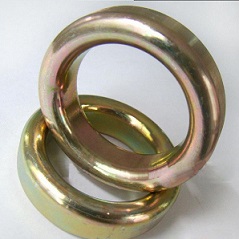How Serious Is a Gasket Leak?
2025-11-04
A gasket leak can often be a cause for concern, especially when it happens in critical machinery or automotive components. At Kaxite, we understand how important it is to address gasket leaks promptly, and we’re here to shed some light on the potential risks they pose. Whether you're dealing with a small car engine gasket or a larger industrial machine, identifying and fixing gasket leaks before they escalate is crucial for the longevity and efficiency of your equipment.
In this blog, we will answer key questions about gasket leaks, explore the dangers, and guide you on how to manage these leaks before they become costly repairs. Let’s dive in!
What Exactly Is a Gasket Leak?
A gasket is a crucial component used to seal two surfaces and prevent leaks of fluids or gases. It plays a vital role in maintaining the integrity of your machinery or engine. A gasket leak occurs when this seal becomes damaged or compromised, allowing fluids, air, or gas to escape.
Some of the most common causes of gasket leaks include:
-
Wear and Tear: Gaskets naturally degrade over time due to constant exposure to heat, pressure, and chemicals.
-
Improper Installation: Incorrect installation or tightness can cause a gasket to fail.
-
Environmental Factors: Extreme temperatures, vibrations, or exposure to corrosive substances can weaken the gasket material.
How Serious Can a Gasket Leak Be?
A gasket leak might seem like a minor issue at first, but it can lead to serious problems if left unchecked. Here’s a breakdown of the potential risks associated with gasket leaks:
| Risk | Potential Impact |
|---|---|
| Reduced Efficiency | Leaks can lead to loss of pressure or fluid, reducing machine efficiency. |
| Increased Maintenance Costs | A small leak can cause other components to wear down faster, leading to costly repairs. |
| Safety Hazards | Leaking fluids or gases can be hazardous, especially in industrial or automotive environments. |
| Environmental Impact | Leaked fluids, like oil or coolant, can cause environmental damage if not contained. |
| Complete System Failure | If the gasket leak worsens, it could lead to catastrophic system failure, causing downtime and major repair expenses. |
How Can You Identify a Gasket Leak?
It’s essential to spot a gasket leak early to prevent further damage. Some common signs to look out for include:
-
Visible Fluid Leaks: If you notice fluids pooling around engine parts or machinery joints, it’s a good sign that a gasket is leaking.
-
Strange Noises: Air escaping from a gasket leak can cause unusual hissing or whistling sounds in your system.
-
Engine Overheating: For automotive engines, a failing gasket can lead to coolant leaks, causing your engine to overheat.
-
Oil Spots: In vehicles, you might notice oil spots on your driveway, which could indicate a gasket leak.
-
Unusual Exhaust Smoke: White smoke from the exhaust pipe is often a symptom of a blown head gasket in cars.
What Are the Most Common Types of Gasket Leaks?
Different machinery and engines require different types of gaskets. Here are some of the most common gasket types and where they are used:
| Gasket Type | Common Applications |
|---|---|
| Head Gasket | Found in car engines, seals the engine block and cylinder head. |
| Exhaust Gasket | Seals the exhaust manifold to prevent leaks of exhaust gases. |
| Intake Gasket | Seals the intake manifold to prevent air leaks in automotive engines. |
| Oil Pan Gasket | Used in engines to seal the oil pan and prevent oil leaks. |
| Flange Gasket | Used in industrial applications like pumps and pipes to seal flanged joints. |
How Can You Fix a Gasket Leak?
Fixing a gasket leak requires timely intervention. Depending on the severity, here are a few options:
-
DIY Repair: For minor leaks, you can try using a gasket sealer to seal the leak temporarily. This method works best for small leaks or when the leak is not critical.
-
Replace the Gasket: In most cases, especially for severe leaks, you will need to replace the faulty gasket with a new one. Be sure to use a high-quality replacement gasket to prevent future leaks.
-
Professional Help: If you are unsure about the extent of the damage or how to proceed, it's best to consult a professional. At Kaxite, our experts can guide you through the process and ensure your system operates at peak performance.
Why Should You Choose Kaxite for Your Gasket Solutions?
At Kaxite, we specialize in providing high-quality gaskets for various applications, including automotive and industrial machinery. Whether you need a replacement for a blown head gasket or are looking for custom gasket solutions for your industrial equipment, we offer durable, cost-effective products designed to meet your needs.
How Can You Prevent Future Gasket Leaks?
Prevention is always better than cure. Here are some steps you can take to minimize the risk of gasket leaks:
-
Regular Maintenance: Perform routine checks and replace gaskets before they show signs of wear.
-
Proper Installation: Ensure that your gaskets are installed correctly to avoid undue stress on the material.
-
Use the Right Materials: Always choose high-quality gaskets that are suitable for the specific operating conditions of your equipment.
Ready to Fix That Gasket Leak?
If you’re experiencing a gasket leak or want to ensure your machinery stays leak-free, Kaxite is here to help. Our team of experts can assist you with identifying the right gasket solutions and offer reliable, long-lasting products.
Don’t let a small leak turn into a big problem. Contact us today to learn more or get a quote. We’re committed to keeping your equipment running smoothly and efficiently!
